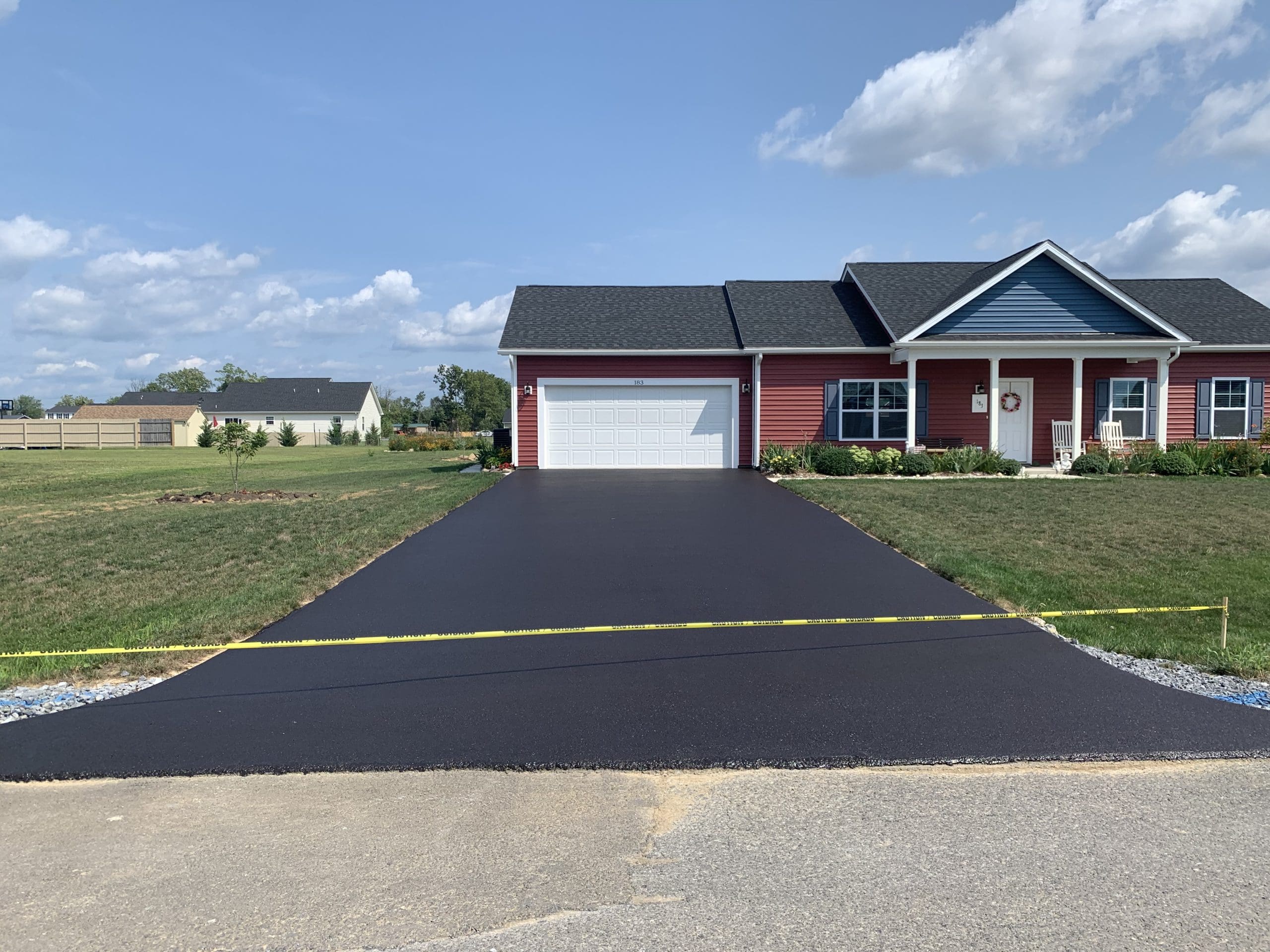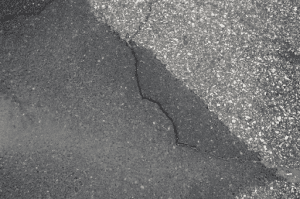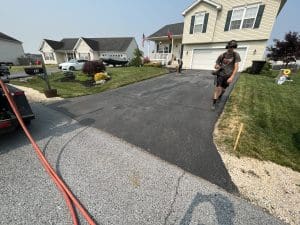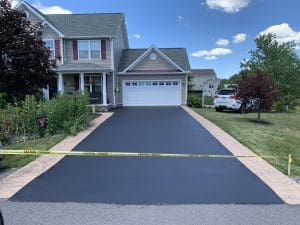Preparing Your Driveway for Winter: Tips and Tricks
Winter can take a toll on your driveway, potentially causing damage and safety concerns. However, with the right preparation and maintenance, you can mitigate the impact of winter weather on your driveway. In this article, we will explore various tips and techniques to help you get your driveway ready for winter, with the assistance of Top Gun Sealcoating’s expert sealcoating services.
Understanding Winter’s Impact on Your Driveway
Before we dive into the specific steps to safeguard your driveway during winter, it’s crucial to grasp how winter weather can affect different types of driveways.
Winter presents a formidable challenge for driveways due to cold temperatures, snow, and ice that can lead to significant damage if not addressed properly. The freeze-thaw cycle stands out as one of the primary culprits behind driveway damage during winter. This cycle occurs when water infiltrates cracks and crevices in your driveway, freezes, and expands as temperatures drop. This expansion can widen existing cracks and create new ones, jeopardizing your driveway’s structural integrity.
Consider, for instance, a concrete driveway. Concrete is particularly vulnerable to the freeze-thaw cycle during winter. As water infiltrates cracks and freezes, it exerts pressure on the surrounding concrete, causing cracks and deterioration over time. Repeated cycles of freezing and thawing can exacerbate these issues, emphasizing the need for preventative measures.
But it’s not only the freeze-thaw cycle that poses risks. Snow and ice can also inflict damage on your driveway materials. Heavy snow can add excess weight, leading to cracks and uneven surfaces. When combined with the freeze-thaw cycle, this weight can further deteriorate your driveway. Ice, on the other hand, can create a slippery surface, increasing the risk of accidents.
Different driveway materials, such as concrete, asphalt, and pavers, each react differently to winter conditions. While concrete is durable, it can still suffer winter-related damage. Asphalt, while more flexible and less prone to cracking, may require additional maintenance to endure harsh winter weather. Pavers, with their interlocking design, offer better drainage and crack resistance but may need occasional re-leveling.
Understanding these distinctions is crucial for preserving your driveway’s longevity. By recognizing how winter weather can impact your specific driveway material, you can take appropriate measures to protect and maintain it throughout the winter months. Whether it involves sealing cracks, applying protective coatings, or employing de-icing agents, there are various ways to safeguard your driveway from winter’s destructive effects.
Essential Pre-Winter Driveway Maintenance
Now that we comprehend how winter weather affects driveways, let’s delve into the essential pre-winter maintenance steps you should consider, with the expertise of Top Gun Sealcoating.
Cleaning and Clearing Your Driveway
Before winter arrives, it’s vital to thoroughly clean and clear your driveway of debris, leaves, and dirt. These remnants can trap moisture, accelerating the freeze-thaw cycle and increasing the risk of cracks. Additionally, removing any weeds or vegetation from cracks will prevent them from spreading further during winter.
Cleaning your driveway should be done with the right tools and techniques. A broom or leaf blower can effectively remove loose debris, while a pressure washer can tackle stubborn dirt and grime. Pay special attention to the edges of your driveway, where debris tends to accumulate.
Furthermore, if there are any oil stains on your driveway, it’s crucial to address them before winter. Oil can penetrate the surface and weaken it, making it more susceptible to winter damage. Utilize a degreaser or a mixture of baking soda and warm water to remove oil stains effectively.
Repairing Cracks and Holes
Pre-existing cracks or holes should be repaired before winter to prevent them from worsening. Small cracks can be filled with appropriate crack sealants, while larger cracks and holes may necessitate professional repair. By addressing these issues beforehand, you can ensure that your driveway remains intact during winter.
Choosing the right type of crack sealant is essential when repairing cracks. There are different sealants available, such as asphalt-based or concrete-based sealants, depending on your driveway’s material. Thoroughly clean the cracks before applying sealant to ensure proper adhesion.
In addition to cracks, pay attention to any potholes or depressions in your driveway. These can collect water, which can freeze and expand during winter, causing further damage. Potholes should be filled with a suitable patching material and compacted to create a smooth surface.
For larger cracks or extensive damage, it’s advisable to consult Top Gun Sealcoating, experts in driveway repair. They possess the expertise and equipment to assess your driveway’s condition and provide the most suitable repair solutions.
Remember, maintaining your driveway before winter not only protects it from potential damage but also ensures a safe and smooth surface for walking and driving. By following these essential pre-winter maintenance steps, you can prolong your driveway’s lifespan and minimize costly repairs in the future.
Choosing the Right De-Icing Materials
When winter arrives, you’ll need to use de-icing materials to keep your driveway safe and accessible. However, not all de-icers are created equal, and some can harm your driveway and the environment. Consider these factors when selecting de-icers:
Pros and Cons of Different De-Icers
Rock salt, also known as sodium chloride, is a popular and cost-effective de-icing option. However, it can corrode concrete and metal surfaces over time. Calcium chloride is another effective de-icer but can be harmful to plants and pets. Magnesium chloride and potassium chloride are more environmentally friendly alternatives but may be less effective in extremely cold temperatures. Understanding the pros and cons of each de-icer will help you make an informed decision.
Environmentally Friendly De-Icing Options
If you’re concerned about the environmental impact of de-icers, there are several eco-friendly alternatives available. These include sand, which provides traction but does not melt ice, and calcium magnesium acetate, a biodegradable de-icer made from limestone and vinegar. While these options might not be as effective as traditional de-icers, they offer a more sustainable solution.
Snow Removal Techniques for Your Driveway
During winter, regular snow removal is essential to ensure the safety and accessibility of your driveway. Here are some effective snow removal techniques:
Manual Snow Removal Tips
If you prefer a hands-on approach, investing in a sturdy snow shovel is essential. When shoveling snow, start from the middle of your driveway and work outward. Lift the snow instead of pushing it, as pushing can stress your driveway. Apply a layer of de-icer before shoveling to make snow removal easier.
Using Snow Blowers Effectively
For larger driveways, a snow blower can be a valuable tool. When using a snow blower, avoid throwing snow against your house or other structures, as it can cause damage. Always follow the manufacturer’s instructions and clear any obstacles from your driveway before starting the snow blower.
Protecting Your Driveway Throughout Winter
While pre-winter maintenance and snow removal are essential, it’s equally important to continue caring for your driveway during the winter season.
Regular Winter Driveway Care
Inspect your driveway regularly for new cracks or damage caused by winter weather. Address any issues promptly to prevent them from worsening. Avoid using metal shovels, which can scratch and damage your driveway surface. Instead, opt for plastic or rubber-edged shovels that minimize potential harm.
Preparing for Heavy Snowfall and Ice Storms
If you reside in an area prone to heavy snowfall or ice storms, it’s prudent to be prepared. Maintain an emergency supply of de-icing materials, such as rock salt or sand, to ensure you can keep your driveway safe and accessible during severe weather. Consider hiring Top Gun Sealcoating for professional snow removal services to handle excessive snow accumulation or ice build-up, particularly if you’re unable to do so yourself.
By following these tips and techniques, you can effectively prepare your driveway for winter, with Top Gun Sealcoating as your trusted partner. Minimize the impact of harsh winter weather, and remember that regular maintenance and timely repairs are key to ensuring your driveway’s longevity and functionality year after year.




